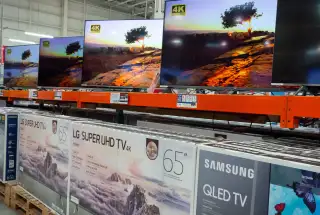Costco Says ‘Prices Will Go Up’ Because of America’s Trade Wars. Here’s What Will Cost You More

Costco is beloved by shoppers for providing great value and low prices on household staples like cheese, cooking oil, pet food, and beer and wine. Fans especially love how famously reluctant Costco is to raise prices on some of its very best deals, like ready-to-eat rotisserie chickens and its hot dog-and-drink combo, which have been priced at $4.99 and $1.50, respectively, for decades.
But now, Costco says it's going to be raising prices on many items — and the company is pointing to U.S. tariffs on China as the reason why.
"At the end of the day, prices will go up on things," Costco chief financial officer Richard Galanti said this week in a call with investors, in response to a question about the impact of the trade war with China.
The Trump administration recently increased tariffs on China from 10% to 25% on $200 billion worth of imports, and President Donald Trump has threatened to increase tariffs to 25% on $325 billion more worth of imports if the countries cannot reach a trade deal. Trump says that the tariffs are necessary to force China to accept more U.S. imports, and he has argued that Americans aren't being hurt by the negotiating ploy because it's China who pays for the tariffs.
But it's ultimately the importers in the U.S. who pay for the tariffs on China, and economists say that these cost increases are passed along to American consumers by way of higher prices on a wide range of merchandise, including electronics, clothing, and auto parts. Shoppers seem to understand this is how tariffs work: In a new poll, 62% of Americans surveyed said that U.S. consumers would bear more of the costs from tariffs than Chinese companies.
Major retailers like Walmart, Target, and Macy's have been saying for months that the trade war with China would force them to raise prices. More recently, some 200 shoe companies signed a letter to President Trump asking him to drop tariffs on China — which have been estimated to cost each American family an extra $132 in footwear annually.
Now, even Costco, the warehouse store retailer that stands out for being fanatical about cost control, says that price increases are inevitable because of the trade war.
"We want to be the last to raise prices," Costco CFO Galanti said this week, but "it doesn't mean we're going to wait and not do it at all."
Galanti said that Costco has been trying to avoid price hikes. Among other strategies, it has been looking to import certain goods from countries other than China, so that the tariffs are removed from the equation. But China is the only viable option for importing certain products, and in some cases, "prices will go up," Galanti said.
It's unclear exactly what products would see price hikes and the degree to which Costco prices will increase. Analysts have said that it's highly likely that shoppers will be paying more for electronics such as smartphones and TVs, as well as furniture, bikes, clothing, and footwear because of tariffs on China.
One recent report, from analysts at UBS, said that Trump's trade war with China could result in "widespread store closures" in the U.S. retail scene. That's especially bad news for the retail segment, which in 2019 is already on pace to see the most store closures for any year on record.
The impact on shoppers, in the form of higher prices, will only increase as the trade war with China remains unresolved. "The real unknown is how long it's going to last," Costco's Galanti said. It's "a whole new ballgame," if the new round of threatened Trump tariffs goes into effect, and if the trade war persists for months longer. As the trade war stretches on, costs will inevitably increase for "electronics and apparel and phones and televisions," Galanti said.